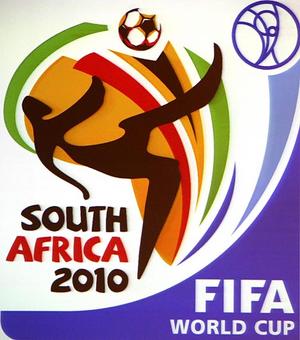World Cup watchCorporate set stays away from World Cup
Not only individual soccer fans stay away from the World Cup in South Africa, which opens tomorrow — corporations stay away, too; FIFA has admitted defeat by putting 38,000 corporate tickets on the open market; worried about personal safety of top executives and rich clients, and fearful of cost and criticism that they are spending on jaunts, corporations decided not to buy corporate tickets for the games

Logo of the 2010 World Cup // Source: allsportsschedule.com
They were reviled as the prawn sandwich brigade but, for this World Cup at least, they will have to stay at home and make their own sandwiches and buy their own champagne. Corporate hospitality has slumped at the World Cup in South Africa.
The Times reports that one estimate claims that bookings are down by 46 percent on the 2006 World Cup in Germany. FIFA has admitted defeat by putting 38,000 corporate tickets on the open market.
With FIFA expected to make billions of dollars in profit from the World Cup — mostly of it from TV broadcasting contracts — one of the big losses the organization will incur will be in the corporate hospitality boxes shunned by companies. Worried about personal safety of top executives and rich clients, and fearful of cost and criticism that they are spending on jaunts, corporations decided not to buy corporate tickets for the games.
Roy Keane was first to criticize the fat cats who inhabited the corporate boxes at Old Trafford when captain of Manchester United, calling them the “prawn sandwich brigade.” Instead of “suits” inhabiting the boxes in the World Cup stadiums, there could be ordinary fans — as long as they are prepared to pay $200 (£139) for Super Category 1 tickets.
Jérôme Valcke, the FIFA general secretary, admitted that Match, the business in charge of World Cup corporate hospitality, will not make a profit out of this summer’s tournament, something that did not surprise industry watchers who were already being told by dozens of British companies that they could not afford to entertain clients.
“Hospitality was always going to be tough in South Africa because it is so far away from the big commercial centers, and by that I mean Europe and America,” said Nigel Currie, the director of BrandRapport, the sponsorship expert. “Sponsors for Germany in 2006 were able to get a load of tickets, round up their clients, fly them over to Germany, wine and dine them and then get them back. It was relatively cost-effective. It seems some sponsors lined themselves up and got tickets for games in South Africa, but then were not prepared to spend £3,000 or £4,000 flying people out there. The whole cost was just not an option for companies in Europe who would not be able to justify it in the present climate.”
Royal Bank of Scotland is typical of the reluctance to spend too big on this World Cup. The state-owned bank is entertaining as many as 3,000 clients with a big screen at its London headquarters instead of flying valued corporate customers to South Africa.
FIFA’s accountants are not quaking: the six top-tier sponsors — including Sony, adidas, and Coca-Cola — have stumped up an estimated £75 million each to associate their names with the World Cup.
Together with broadcast revenues thought to be topping $2.1 billion, according to figures from Sportcal, the sports marketing research group, the World Cup in South Africa will swell FIFA’s coffers to bursting. Total commercial revenues, according to Sportcal, could be as much as $3.3 billion — 48 percent up on the 2006 World Cup. FIFA is expected to announce details of its income this week.
